It's unsettling, isn't it? To look around and wonder if another economic downturn is looming. I remember vividly the anxiety that gripped our community during the 2008 recession. Seeing neighbors lose their homes, friends struggling to find work… it left a mark. It made me realize how much we all rely on a stable economy, and how little many of us understand the forces that shape it. I’ve always believed that knowledge is power, and that understanding the “why” behind events can help us navigate them with greater resilience. That’s why I’m so excited to share this curated list of books with you. These aren’t dry textbooks filled with confusing jargon. Instead, they’re accessible explorations of economic recessions – what causes them, what they mean, and what we might be able to do to prepare. We’re going to tackle some big ideas together, but I promise to keep it straightforward and relatable. Let's dive in and learn together.
House of Debt: How They (and You) Caused the Great Recession, and How We Can Prevent It from Happening Again
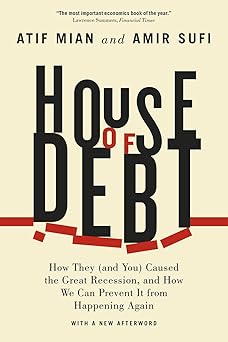
The story of the Great Recession is one that still resonates deeply with many of us, especially those who lost their jobs, homes, or struggled to make ends meet. In the years leading up to the crisis, household debt in the US skyrocketed, doubling from $7 trillion to $14 trillion between 2000 and 2007. This rapid rise in debt was not a coincidence, but rather a symptom of a deeper problem. As Atif Mian and Amir Sufi, two economists who have spent years studying the roots of the crisis, show us, the Great Recession was not just a banking crisis, but a household debt crisis. When households take on too much debt, they are less likely to spend, and when they do, it's on essential goods and services, not discretionary items. This, in turn, leads to a decrease in demand, which causes production to slow down, and ultimately, leads to massive job losses. The authors of House of Debt argue that the current economic system is set up to protect banks and creditors, rather than individuals, which means that debt forgiveness is not enough to break the cycle of debt and recession. Instead, they propose new mortgage contracts that share the risk of lending, rather than the individual homeowner. This approach has the potential to prevent the housing bubble from forming in the first place, and to create a more stable financial system. The authors' research is thorough and compelling, and their answers to some of the most pressing questions facing the modern economy today are convincing and thought-provoking.
Discover this book on Amazon (affiliate link)
A Crash Course on Crises: Macroeconomic Concepts for Run-Ups, Collapses, and Recoveries
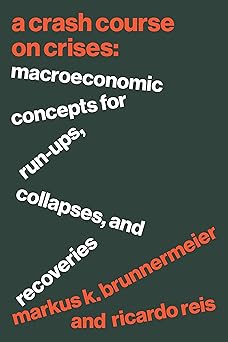
Financial crises have become increasingly frequent in modern economies, causing deep and prolonged recessions. A book by Markus Brunnermeier and Ricardo Reis provides an in-depth analysis of the macroeconomics of financial crises, shedding light on the triggers and consequences of these events. The authors explore how debt contracts, banks, and the search for safety can contribute to the onset of a crisis, using case studies from various countries, including Chile in the 1970s and the COVID-19 pandemic. By examining the run-up phase of a crisis, the book reveals how preventable issues may go unnoticed, and how monetary, fiscal, and exchange-rate policies can be used to mitigate the effects of a crisis. The authors' analysis is grounded in cutting-edge economic research, and their clear analytical framework and novel diagrams make the book's complex concepts accessible to a broad audience. Through its ten self-contained chapters, the book provides a comprehensive overview of the macroeconomic forces that drive financial crises, and offers policymakers and students alike a clearer understanding of how to prevent and respond to these events. By synthesizing a vast literature into ten simple and accessible ideas, the book aims to illuminate these concepts and provide a framework for understanding the complex dynamics of financial crises.
Discover this book on Amazon (affiliate link)
How Markets Fail
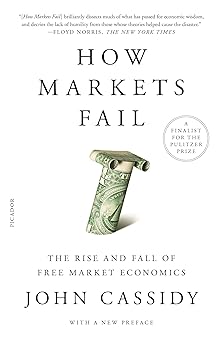
In this thought-provoking book, the author, John Cassidy, takes us on a journey to uncover the flaws in the way our economy is thought to work. He explains that for the past fifty years, economists have been trying to create perfect theories on how markets should function, focused on innovation, wealth creation, and efficient resource allocation. However, what about when these markets fail? Cassidy delves into the world of "utopian economies," which are driven by an ideology that ignores the complexities of human behavior and the consequences of unregulated markets. He shares his own experiences, having reported on the ground, and uses clear explanations of economic theories to highlight the dangers of blindly following old orthodoxies. The author's words are a reminder that the pursuit of profit and growth can lead to devastating consequences, such as stock market bubbles, inequality, and environmental degradation. Cassidy's work serves as a warning, urging us to reevaluate our economic systems and consider the human impact of our decisions.
Discover this book on Amazon (affiliate link)
Financial Crises : Causes, Consequences, and Policy Responses
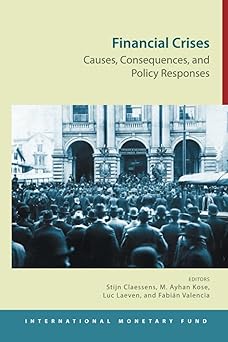
I've been reading a book that made me think about how our economies work and how we can make them more stable. The book talks about all the different types of financial crises that happen and how they affect countries and people's lives. It's like imagine you're planning a big party and you have to make sure everything goes smoothly, but sometimes things can go wrong and the party gets out of control. The book explains how financial crises can happen, what happens to people's jobs and savings, and how countries can work together to prevent them. It also talks about what happens in the long run, like how a crisis can affect a country's economy for years after it's over. What really struck me was how the book showed that there's nothing to be afraid of. Even when things seem really bad, there are always lessons to be learned and things that can be done to prevent similar crises from happening again. The book also showed me that countries can learn from each other and work together to make their economies stronger. The book is filled with statistics and research, but it's not hard to understand, even if you're not a economist. It's written in a way that makes you feel like you're reading a report from a friend who's done their research. Reading this book made me realize how much we can learn from each other and how important it is to work together to make our economies better.
Discover this book on Amazon (affiliate link)
Never Let a Serious Crisis Go to Waste: How Neoliberalism Survived the Financial Meltdown
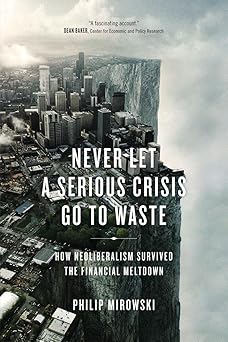
This book is a powerful critique of neoliberalism, a ideology that has been widely debated in recent years. The author, Philip Mirowski, argues that neoliberalism has become so deeply ingrained in our economic thought that it has become impossible to challenge its underlying principles. As I reflect on my own experiences with economic theory, I am reminded of the power of ideas to shape our understanding of the world. I recall attending a workshop on economic policy where a prominent economist was defending the idea that austerity was the best way to stimulate growth. The room was filled with experts, and yet, the debate was dominated by a handful of individuals who seemed to be hiding behind a veil of certainty. Mirowski's book offers a similar critique, exposing the flawed logic behind neoliberal thought and laying bare the charlatans who are driving our economic policies. The author's writing is engaging and accessible, making the complex ideas behind neoliberalism easy to follow. Through his analysis, Mirowski reveals how neoliberalism has become a kind of cognitive dissonance, where those who hold the ideology are unable to see the flaws in its logic, even when faced with contradictory evidence. The result is a theory that is both convincing and completely wrong. The book is a must-read for anyone who wants to understand the root causes of the current economic crisis and how we can work towards a more equitable future.
Discover this book on Amazon (affiliate link)